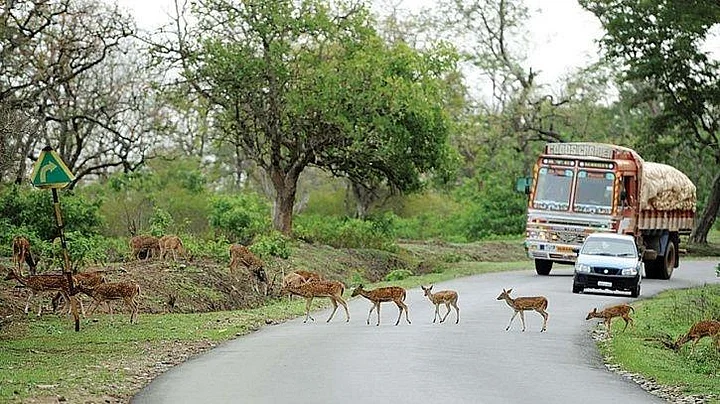Former Congress President and Wayanad MP Rahul Gandhi joined a group of protesters in Wayanad district of Kerala on Friday, 4 October. The agenda for the one-day trip to his constituency was to show support for a hunger strike that demands lifting the ban on night travel on a 19 km stretch through the tiger habitat of Bandipur National Park in Karnataka.
"They represent the suffering of the people here. All political parties are united as far as the night travel ban issue is concerned. There is no political difference on this," Rahul said.
The protesters, led by traders and transport operators in the district, have been arguing that the night travel ban has affected the right to movement of the people and led to losses in trade.
While the protest is expected to gain momentum with Rahul Gandhi's support, across the border in Karnataka, environmentalists have a different story to tell.
Since the introduction of the ban in 2010, there has been a 50 percent reduction in the number of roadkills. They argue that the lifting of the ban would take things back to square one since more than 7,000 vehicles pass through during the day itself.
The Numbers Tell the Story
The movement of vehicles at night on the 19-km forest leg of NH 766 was banned by the Chamarajanagar district administration in August 2009. According to the forest department, between 2004 to 2009, before the ban was implemented, 93 roadkills were reported on this stretch.
Following these deaths, a report was prepared by Bandipur Tiger Reserve officials, which found that at least one vehicle passed through this stretch every minute at night. This report led to the closing of night travel.
Latest figures show that between 2010 and 2018, the number of deaths in the area came down to 34.
The Demand to Reopen the Road
In 2009, soon after the ban was imposed, the transport operators and traders approached the deputy commissioner of the district and reversed the ban. But environmentalists approached the Karnataka High Court and got an interim order reinstating the ban. This order was later upheld by the high court in 2010.
On 7 August, the Supreme Court upheld the night traffic ban, which was supported by Karnataka and Tamil Nadu, but opposed by Kerala.
Traders and transport operators, mostly in Kerala, claim the ban on night travel has severely affected trade between neighbouring districts. They also argued that residents are facing difficulties in commuting.
The United Conversation Movement (UCM), a group of environment protection groups, say the claims are unfounded. “Eight buses from Karnataka and eight from Kerala travel on this stretch every night. Ambulances, security forces and emergency cases are allowed to go through. This is not a people’s problem but vested interest of some people,” said Joseph Hoover of UCM.
Talking about the ban affecting trade, he added that Mysore market closes at 5 pm, which gives ample time for vehicles to move before the road closes.
Karnataka Government Firm on Ban
While activists in Karnataka are preparing to protest in Bengaluru and Bandipur on the same day Rahul Gandhi meets the protesters, the Karnataka government has said that the ban will not be lifted.
Talking to reporters, Karnataka Chief Minister BS Yediyurappa said: "I cannot go against the court order. The court has ordered not to allow vehicles in the night in Bandipur forest area," the CM said.
However, environmentalists are preparing for a long battle with Rahul Gandhi now lining up on the opposite side. They say they are ready for legal battles to ensure that wildlife is not destroyed for the interests of the trading community.
(At The Quint, we question everything. Play an active role in shaping our journalism by becoming a member today.)
